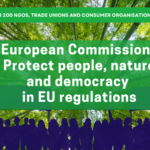
- Marginal gains in some areas of the ECT are outweighed by increased risks associated with expansions to new technologies and geographies.
- A reformed ECT could harm and not help accession countries in the Global South to regulate their energy markets in the public interest, adapt to and mitigate climate change.
- Adopting a reformed ECT will greenwash it and make the real solution – withdrawal – much harder to realise.
The Energy Charter Treaty (ECT) is widely recognised to be incompatible with the objectives of the Paris Climate Accord. Fossil fuel companies are using it to sue states in a private, parallel justice system when their profits are affected by regulations or court decisions. The latest IPCC report therefore warns that the ECT and similar agreements can have a chilling effect on climate policies. States might avoid taking the necessary urgent steps to phase-out fossil fuels if threatened by expensive legal action and the prospect of having to pay uncapped amounts in compensation.
The European Commission and Member States have recognised the ECT as outdated and seek to modernise it as part of a reform process, which started in 2018 and is drawing to a close this year. Both the EU and other ECT Contracting Parties now have to assess the outcomes of this reform and decide: Shall we stay or shall we go?
In a briefing in March 2022 CAN Europe analysed the outcomes of the reform and explained why they are insufficient to achieve the EU’s own objectives for ECT reform. However, proponents of the treaty now argue that even though the reform outcomes are limited, they nevertheless provide for some improvements compared to the old ECT and that it is therefore better to sign off on the reform.
This briefing argues that Contracting Parties should not fall into the trap of reforming the ECT and recognise that adopting those outcomes would spell a disaster from a climate perspective:
- Reform would make the ECT more dangerous because it expands the list of energy materials and products that are protected under the ECT’s flawed Investor-State Dispute Settlement (ISDS) and hence increase the risk of arbitration claims against states regulating the transition to 100% renewable energy.
- There are dozens of countries in the Global South that are in the process of joining the ECT. Accessions have been put on hold while the reform is ongoing. However, once the reform has been approved, it is expected that many of them will join the ECT in the false hope of increasing foreign direct investments in energy but actually severely limiting their policy space to phase-out fossil fuels and regulate their energy markets in the public interest.
- Thirdly, the reform doesn’t fix the many flaws of the Treaty. Adopting it nevertheless would greenwash the ECT and stifle the growing momentum to implement the only real solution: A coordinated withdrawal of ideally all EU Member States, the EU itself, EU Accession states and other close allies in Europe and beyond.



